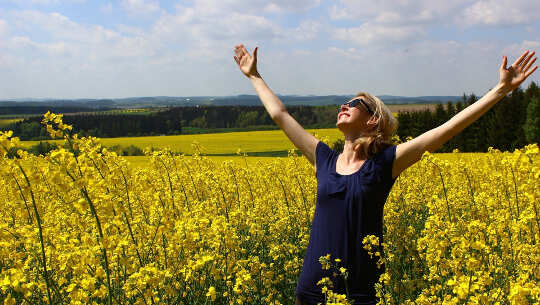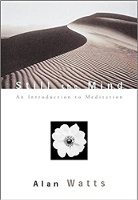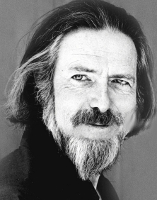
Image from Pixabay
What we call meditation or contemplation -- for want of a better word -- is really supposed to be fun. I have some difficulty in conveying this idea because most people take anything to do with religion seriously -- and you must understand that I am not a serious person. I may be sincere, but never serious, because I don't think the universe is serious.
And the trouble comes into the world largely because various beings take themselves seriously, instead of playfully. After all, you must become serious if you think that something is desperately important, but you will only think that something is desperately important if you are afraid of losing it. In one way, however, if you fear losing something, it isn't really worth having. There are people who live in dread, and then drag on living because they are afraid to die. They will probably teach their children to do the same, and their children will in turn teach their own children to live that way. And so it goes on and on.
But let me ask you, if you were God, would you be serious? Would you want people to treat you as if you were serious? Would you want to be prayed to? Think of all the awful things that people say in their prayers. Would you want to listen to that all the time? Would you encourage it? No, not if you were God.
In the same way, meditation is different from the sort of things that people are supposed to take seriously. It doesn't have any purpose, and when you talk about practicing meditation, it's not like practicing tennis or playing the piano, which one does in order to attain a certain perfection. You practice music to become better at it, maybe even with the idea that you may someday go on stage and perform. But you don't practice meditation that way, because if you do, you are not meditating.
THE PRACTICE OF MEDITATION
The only way you can talk about practice in the context of meditation is to use the word practice in the same way as when somebody says that they practice medicine. That is their way of life, their vocation, and they do it nearly every day. Perhaps they do it the same way, day after day -- and that's fine for meditation too, because in meditation there is no right way and there is no idea of time.
In practicing and learning things, time is usually of the essence. We try to do it as fast as possible, and even find a faster way of learning how to do things. In meditation a faster way of learning is of no importance whatsoever, because one's focus is always on the present. And although growth may occur in the process, it is growth in the same way that a plant grows.
THE ESSENTIAL PROCESS
This is the beginning of meditation. You don't know what you're supposed to do, so what can you do? Well, if you don't know what you're supposed to do, you watch. You simply watch what is going on.
When somebody plays music, you listen. You just follow those sounds, and eventually you understand the music. The point can't be explained in words because music is not words, but after listening for a while, you understand the point of it, and that point is the music itself.
In exactly the same way, you can listen to all experiences, because all experiences of any kind are vibrations coming at you. As a matter of fact, you are these vibrations, and if you really feel what is happening, the awareness you have of you and of everything else is all the same. It's a sound, a vibration, all kinds of vibrations on different bands of the spectrum. Sight vibrations, emotion vibrations, touch vibrations, sound vibrations -- all these things come together and are woven, all the senses are woven, and you are a pattern in the weaving, and that pattern is the picture of what you now feel. This is always going on, whether you pay attention to it or not.
Now instead of asking what you should do about it, you experience it, because who knows what to do about it? To know what to do about this you would have to know everything, and if you don't, then the only way to begin is to watch.
Watch what's going on. Watch not only what's going on outside, but what's going on inside. Treat your own thoughts, your own reactions, your own emotions about what's going on outside as if those inside reactions were also outside things. But you are just watching. Just follow along, and simply observe how they go.
Now, you may say that this is difficult, and that you are bored by watching what is going on. But if you sit quite still, you are simply observing what is happening: all the sounds outside, all the different shapes and lights in front of your eyes, all the feelings on your skin, inside your skin, belly rumbles, thoughts going on inside your head -- chatter, chatter, chatter. "I ought to be writing a letter to so-and-so.... I should have done this" -- all this bilge is going on, but you just watch it.
You say to yourself, "But this is boring". Now watch that too. What kind of a funny feeling is it that makes you say it's boring? Where is it? Where do you feel it? "I should be doing something else instead." What's that feeling? What part of your body is it in? Is it in your head, is it in your belly, is it in the soles of your feet? Where is it? The feeling of boredom can be very interesting if you look into it.
Simply watch everything going on without attempting to change it in any way, without judging it, without calling it good or bad. Just watch it. That is the essential process of meditation.
Reprinted with permission of the publisher,
New World Library, Novato, CA 98989. ©2000.
www.newworldlibrary.com.
Article Source
Still The Mind: An Introduction to Meditation
by Alan Watts.
 Mark Watts compiled this book from his father's extensive journals and audiotapes of famous lectures he delivered in his later years across the country. I
Mark Watts compiled this book from his father's extensive journals and audiotapes of famous lectures he delivered in his later years across the country. I
n three parts, Alan Watts explains the basic philosophy of meditation, how individuals can practice a variety of meditations, and how inner wisdom grows naturally.
Also available as an Audiobook and as a Kindle edition.
About the Author
 Alan Watts was one of the most famous and endearing writers and speakers of the twentieth century on the subjects of Eastern thought and meditation. He was born in England in 1915 and died in his home in northern California in 1973.
Alan Watts was one of the most famous and endearing writers and speakers of the twentieth century on the subjects of Eastern thought and meditation. He was born in England in 1915 and died in his home in northern California in 1973.
In all, Watts wrote more than twenty-five books and recorded hundreds of lectures and seminars. He became widely recognized for his Zen writings and for The Book on the Taboo Against Knowing Who You Are.
For more info, visit www.alanwatts.com.






























